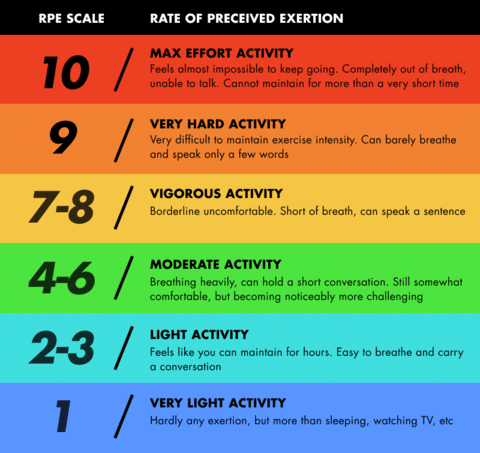How do I start to get fit?
What we’ll cover
Every year, thousands of us embark on fitness regimes as part of New Year’s resolutions. Unfortunately, this coincides with an influx of injuries associated with overuse that commonly present around the end of January and onwards. These vary from muscle strains, tendinitis (achilles/glutes) or neck and back pain. Importantly, these injuries can commonly be avoided and our physiotherapist Jason Lee identifies his top tips to avoid those pesky New Year’s injuries.
Get to know your body!
Knowing how hard you are exerting or exercising is a great starting point to any exercise program. Whilst we can monitor our exertion by a range of devices such as heart rate monitors or wearable health devices, a great starting point is your rate of perceived exertion (RPE). Importantly, your RPE is specific and individual to you. In fact, you will notice that as you progress, your RPE will actually decrease as particular exercises get easier with improvements in fitness. This allows you to benchmark and progressively build on your exercise program.
If you are just starting out with exercise, it is recommended to start with moderate intensity exercise. A great indicator for moderate intensity exercise is the capacity to exercise and hold a short conversation.

Rest and recover
Recovery and rest is crucial to any exercise program. We know that sleep and recovery days are equally important in order to your body to adapt positively to your exercise program.
Include rest days into your exercise routine. This is essentially a day in which you take it easier and perform light activity. Depending on your current fitness levels, this could vary from a day of “incidental exercise” or a slow steady jog. The whole purpose of this day is to not exert the same amount of cardiovascular expenditure or musculoskeletal train. In fact, research suggests that those who have less than two rest days per week have a 5 x increased likelihood of over injuries.
Sleep is also critical to obtain all the benefits of training. Current guidelines recommend that adults aim for 7 – 9 hours of sleep per night.
Set realistic goals
Goal setting is a great strategy. As physiotherapists, we regularly set goals both short and long term as part of any exercise or rehabilitation program. Importantly, be realistic with your goals! If your goals are around weight management, be realistic as to what you can actually achieve and is sustainable long term. For example, losing 10 – 15 kg over a month can be entirely unrealistic whilst 0.5 – 1 kg per week is more manageable. Likewise, if your goal is to run a specific distance or event, realistically consider your current running levels and fitness when setting your goals.
Don’t be afraid to ask for help
A qualified health professional is a great starting point to assist with a safe and realistic exercise program. A physiotherapist is well placed to determine what exercises are most appropriate and what modifications (if any) need to be made to your program. This is a great starting point to avoid and minimise the likelihood of injuries.
Remember, whilst the principles of exercise may be similar, a tailored and individualised program is a great way to prevent injury and maximise the benefits of exercise.
Our team pride themselves on offering a range of exercise programs specifically for your individual aims and needs. This ranges from guided home exercise programs through to onsite clinical strength and pilates in our purpose-built gym. Call us today or book online.


